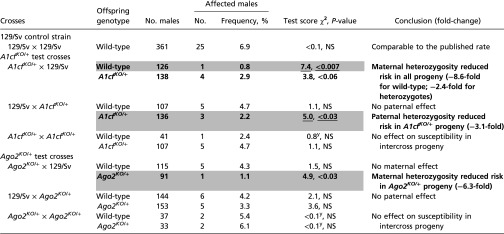Table 1.
Occurrence of TGCT-affected males in the 129/Sv control strain and in A1cfKO/+ and Ago2KO/+ reciprocal backcrosses and intercrosses
 |
A total of 1,589 offspring males, including 361 from 129/Sv control crosses, 1,010 from separate A1cfKO/+ and Ago2KO/+ reciprocal backcrosses, and 218 males from separate A1cfKO/+ and Ago2KO/+ intercrosses, were examined for TGCTs and TAs (Tables 1 and 2 and Table S1). Conventional (Mendelian) inheritance was inferred in cases where maternal and paternal inheritance affected offspring phenotypes similarly. By contrast, a PofO effect was inferred in cases where offspring phenotype depended on parental sex and genotype. χ2 goodness-of-fit tests were used to compare the occurrence of TGCT-affected heterozygous and wild-type males with the 7% baseline in the 129/Sv inbred strain (34, 41, 62, 63). χ2 (χ2) and P values are indicated for each test result (df = 1). Results below the pointwise 0.05 threshold are highlighted in bold font with a gray background. We treated the six tests for each mutant (A1cf and Ago2) as a ”family” of tests. Results that showed family-wide significance at an FDR of 0.1 are underlined. Fold-change refers to results for each mutant test cross versus the 129/Sv control strain. Results highlighted in bold (no gray, no underlining) represent a strong trend with substantial fold-change. NS indicates results that did not pass the threshold of statistical significance. y indicates Yate’s correction was applied to the test.
